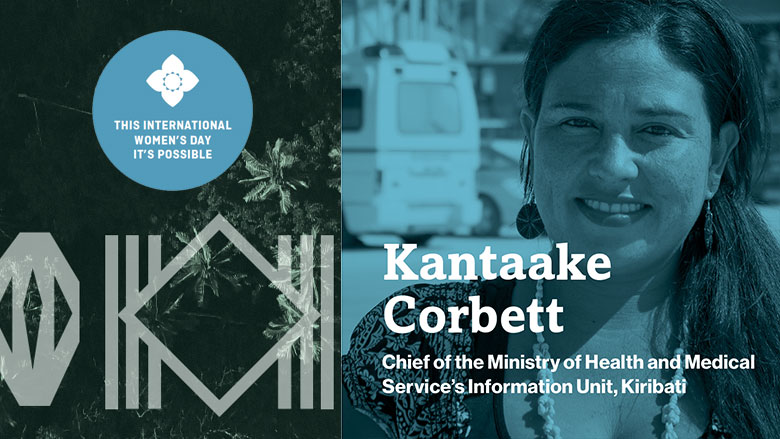Tell us a little about yourself and your work.
My background is in population demography and management, which I studied at the University of the South Pacific. I then came back to Kiribati and I started working in the Statistics Office. And then in 2016 there was an opening in data in the Health Information Office – and I just went into it.
I love data. I just love data. Data is very powerful in decision-making. We have a lot of data in Kiribati and we’re trying to use it to drive coordination in Kiribati’s health system. It makes data and finance come together for a picture on progress. And it helps us understand how we’re doing as a country; to get a clearer picture of NCDs (non-communicable diseases), family planning, communicable diseases and child health. And we’re able to track whether these things are improving.
What are some of the challenges you face?
When I first started, understanding the medical terminology; that was tough. And knowing all the diagnosis codes that doctors write.
And it’s challenging getting doctors and nurses to understand the importance of data. Because sometimes they forget to write the age, sex, or other information – they’re busy people and sometimes they forget. And from our point of view, it’s really important.
Yet we’re giving feedback and we’re seeing improvement; the reporting from across the country, and through different wards in the hospital, is getting better.
How does your job influence patients?
We keep health information, and on the statistics side, and we keep data on issues that can be prevented. Without these statistics, our government won’t know what our people are dying from; what they’re sick from: NCDs, maternal health, premature deaths. Data will really help with government decisions in investing where they can to improve.
What motivates you?
What really motivates me is great leadership and guidance. At the moment I have a great leader – our Public Health Director, Eretii Timeon; she’s a big inspiration for me.
And I am motivated by how I can contribute to the people of Kiribati. And in keeping great data. We have improved it a lot. We’re still a long way from 100 percent correct information, and that really motivates me; I want to make my office the best in the Pacific at capturing data.
What do you believe is truly possible in/for Kiribati?
I believe that improving the health and increasing the life expectancy of our people is truly possible. I believe if we invest more in public health – and preventative measures – we’ll be able to improve the lives of our people. In terms of education and understanding that there are a lot of preventative diseases that can be avoided.
What will health in Kiribati look like in 25 years?
The population won’t decline as quickly. In 25 years we might double the population we have now.
We’ll definitely need a bigger hospital than we have now. But if we implement a lot of the preventative measures we can now, we will have less people coming in to the hospital.
This is the top priority for the country. NCDs is the top priority – and we should continue to do this. This is really all related to our behavior: the way we eat, and the things we can change. So if we can invest in the younger population now; if we can educate them now through ‘life education’, then in 25 years we’ll have the same size of hospital, but with fewer patients.
What’s your big vision for the Pacific?
Kiribati is probably the least developed country in the region – and we can learn from the other bigger countries (Fiji, Samoa). And work together as Pacific Islanders – all of us in the Pacific. We should continue the great work we’re doing together. Because working together gives us a bigger voice. It’s about learning from each other.
------
*The World Bank works to support Kiribati to adapt to the effects of climate change, strengthen public finances, boost inclusive growth, and rehabilitate transport infrastructure.
The views expressed in this article do not necessarily represent the views of the World Bank Group and its employees.

